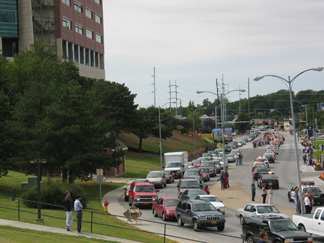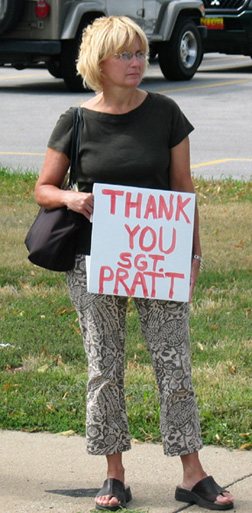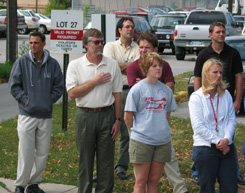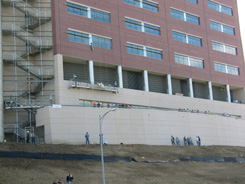 |
UNMC employees Tuesday observe the funeral procession along Saddle Creek Road for Sgt. Jason Pratt. |
Every day, the emergency room staff works closely with police, fire and rescue officials. With daily contact with these individuals, relationships form, and they become “a part of the big team,” said Kathy Warren, trauma nurse coordinator for UNMC.
“Jason’s area was in our part of town, so he was in our hospital often. You work so closely with these people. To have something like this happen, it’s devastating for everyone. It just breaks your heart to see this happen,” said Warren, whose husband, Kirby Warren, recently retired after 27 years with the Omaha Police Department.
For Robert Muelleman, M.D., professor of surgery for UNMC and director of emergency services for The Nebraska Medical Center, the Sept. 11 shooting is still very vivid in his memory.
 |
A woman along the route pays tribute to the fallen officer. |
“I was working that night,” he said. “It wasn’t our trauma night, but we still hear all the calls go out (on the squawk box). When we heard, ‘Policeman down,’ the whole place just went silent.
“It made my hair stand on end. But it really impacts the nursing staff, especially the night shift staff. These nurses get to know the police officers pretty well. They work with them all the time. Every time there is an event involving the police – for instance, a crime or a patient with mental illness – we see them in the emergency room. It’s amazing how close they can become.”
Mike Diggins, an emergency room nurse for The Nebraska Medical Center, has fond memories of Pratt, who died Sept. 19.
“He was a nice man,” Diggins said. “He was patient – and as everyone knows – patience is a virtue. He had a great sense of humor. He was just a good guy. That’s about the best thing you can say about someone. I’ll always remember him for his patience – for the people he served and protected. He was always very congenial and was never hard-nosed.”
Following the shooting of Pratt, the Creighton University Medical Center’s trauma center was shut down due to the chaotic situation that was unfolding, Dr. Muelleman said.
|
|
“We called anesthesiology and surgery right away to make sure there was an OR and surgeon available if a trauma patient needed to go to the OR,” Dr. Muelleman said. “We knew within five minutes that we had the resources and the space, so we called back and said we could take over.”
The scenario was similar to what occurred in 1995 when Omaha Police Officer Jimmy Wilson was shot and brought to University Tower, Dr. Muelleman said.
“That night, we were the trauma center. We had to shut down our emergency room, and Creighton took over.”
The Nebraska Medical Center and Creighton University Medical Center alternate being the designated trauma center. The Nebraska Medical Center is the designated trauma center on Tuesdays, Fridays and Sundays, while Creighton is the designated trauma center on the other four days.
“Friday is probably the busiest day in the emergency room,” Warren said. “More people are off on Friday nights, so we see a lot of injuries from people recreating.”
In 2002, The Nebraska Medical Center admitted 1,001 trauma patients. Amazingly, with 1,011, Creighton had almost exactly the same number of trauma patients in 2002.
 |
Michael Crawford, Ph.D., director of the Munroe-Meyer Institute recreation program, held his hand over his heart for the entire procession, which lasted slightly more than an hour. “People don’t realize how much courage it takes to put on that uniform each day and walk out the door,” he said. “We take it for granted.” |
“On average, we have about three trauma patients per day,” Warren said. “But, this number can be as high as 10 per day. Then, it can really get busy.”
Of the 1,001 trauma patients at The Nebraska Medical Center, the Trauma Team was activated on 479 occasions, Warren said.
The Trauma Team is a multi-disciplinary group including surgery, anesthesiology, orthopedic surgery, the emergency room physicians and nurses, radiology technologists, radiology, phlebotomists, the blood bank, operating room personnel, pastoral care and the hospital nursing resource coordinators.
“It’s truly a team effort. There’s no other way to describe it,” Warren said.
Thoughts along the funeral procession route
“It’s the right thing to do. These people lay it on the line for us every day. The least we can do is turn out and show them some respect. People don’t realize how much courage it takes to put on that uniform each day and walk out the door. We take it for granted.”
Michael Crawford, Ph.D., director of the Munroe-Meyer Institute recreation program. Dr. Crawford held his hand over his heart for the entire procession, which lasted slightly more than an hour.
“Just disbelief. You always think it’s not going to happen. When something does happen, it’s a shock. It is just a reminder that their lives are in danger every day.”
Jennifer Sanchez, Pharm.D., an inpatient pharmacist for The Nebraska Medical Center. Her husband, Christopher Sanchez, has been an officer with the Omaha Police Department for the past three years. He has known Jason Pratt for several years. They used to work out at the same fitness center. The Sanchez children – Ryan, 3, and Allison, 9 months – are the same ages as Sgt. Pratt’s children.
“I feel for the wife and the children. They (police officers) have a job to do, and they go and do it. This is nice to see, because they aren’t always supported.”
Connie Tostenson, an employee with the Munroe-Meyer Institute. Her husband, Dennis, retired from the Omaha Police Department five years ago after serving on the police force for 27 years.
 |
Construction workers at the Durham Research Center pause Tuesday as the funeral procession travels along Saddle Creek Road. |
Linda Spellman, a 14-year employee with UNMC ITS Video Services
“I just wanted to pay respect for our law enforcement. They do so much for us. It’s the least we can do. Not only for Omaha, but for all law enforcement.”
Mike Overton, a supervisor for UNMC Facilities Management and Planning
“There’s an inherent risk with law enforcement that most of us don’t live with on a day to day basis. They take that risk purposely, putting their lives on the line for people they don’t even know. Unfortunately, it takes something like this to show the public’s outpouring of compassion.”
Susan Smith, manager of the Faculty/Employee Assistance Program at UNMC
“I thought it would be good to come down and support them and the rest of the force.”
Jeremy Barnes of Innovative Laboratory Systems, a contract worker at the Durham Research Center. Both of Barnes’ parents are in law enforcement.